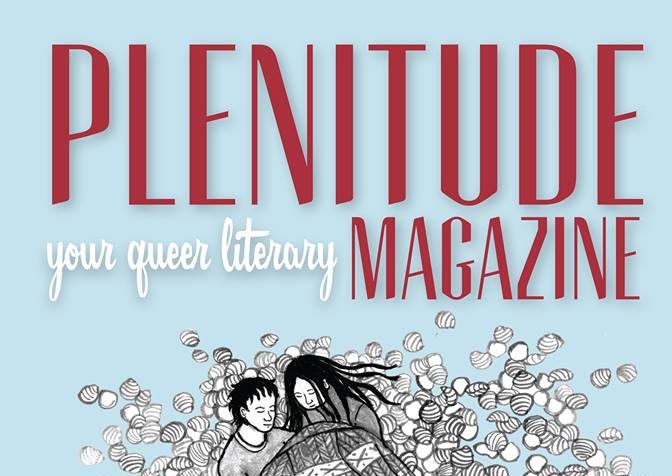New Queer Literature: A Conversation with Plenitude Magazine

Author: Alyssa C. Greene
January 26, 2020
“The work we publish is lyrical, audacious, and innovative.”
Spotlight on New Queer Literature is a monthly series highlighting publications that are LGBTQIA owned, promote queer and trans writers, or publish work on LGBTQIA themes, seeking to connect Lambda’s readership with contemporary queer publishers and authors.
This month, Lambda Literary spoke with Patrick Grace, managing editor of Plenitude Magazine.
Tell us a little bit about Plenitude and its mission.
Plenitude is Canada’s only magazine dedicated entirely to queer and trans literature. We promote the growth and development of LGBTQ2S+ works through online publication of poetry, fiction, creative nonfiction, book reviews, and interviews by emerging and established LGBTQ2S+ writers. Plenitude aims to complicate expressions of queerness through the publication of diverse, sophisticated literary writing, from the very subtle to the brash and unrelenting.
How long has Plenitude been around? How has it developed or changed since it began?
Plenitude was founded in 2012 by Andrea Routley. Aside from a single print issue in 2014 (Issue 5), we have always been a free online publication. We want Plenitude authors’ words to be free and accessible to all, to share their stories and experiences. Our writers and readers already face a spectrum of discrimination, so it makes sense to remove the payment barrier for greater accessibility.
Since its inception, we have grown our social media presence, highlighting not only our authors’ works but relevant news or cultural references that include the larger queer, trans, and non-binary communities. Our website now focuses mainly on literature, interviews, and book reviews. Recently, we have engaged in some exciting projects: in July, we sponsored queer author Byron Sollazzo for Victoria’s “Wilde About Sappho” pride reading; in October, we were invited to Open Space’s Small Press Festival to showcase our magazine and participate in a panel discussion; and in December, we paired with the League of Canadian Poets to highlight five authors and their Plenitude poems as part of the League of Canadian Poets’ Poetry Pause spotlight project.
What kind of work do you publish?
We publish poetry, fiction, creative nonfiction, book reviews, and interviews. Our publishing schedule is fluid thanks to our online platform, but for the most part, we typically publish two poems, one prose piece, and one book review and/or interview every month, all year.
How would you describe Plenitude’s aesthetic?
We’re young without the immaturity, hip without the pretense, assertive without the arrogance. The work we publish is lyrical, audacious, and innovative.
Where can new readers start?
For poetry, that’s tough, but there is one poem that I’d love for readers to get to know. Back in 2016 when I was a new poetry editor with Plenitude, I remember being blown away by Trenton Pollard’s “The Vertigo of Eros.” One word: wow. The couplets, each line as a powerful statement, and the questioning, vulnerable voice—all of these shook me. I am always amazed at the work this poet produces!
For fiction, I’d suggest reading “The Magazine” by Ron Schafrick, published this summer. The lines are clean, the word choice is spot-on, and the voice matches so well with the first-person retrospective POV. There is such restraint here—Schafrick crafted this story perfectly. “The Magazine” does what every great short story should do—it gets us into the mind of the narrator and makes us feel his desire, his guilt, and his shame without overloading us with sentimentality and emotion.
For creative nonfiction, “Times I’ve Been Asked When I’m Due” by Erin Stainsby is a must-read, also published in the summer. Personally, I’m a huge fan of any prose crafted around sections, or lists, or orders of things. The first time, the second time, the third time. It’s a simple but effective style to build momentum in a short piece. There’s something to be said about a memoir written in first person that casts its eye outward to the onlookers, gawkers, and gossipers, a piece that acts as witness and testimony without too much introspection or self-consciousness.
What would you like writers interested in submitting to Plenitude to know?
Temper your sentiment. Buckle down on those poetic truisms and clichés. Rein in those prose scenes full of dialogue that go nowhere. No bleeding hearts, dark abysses, or gratuitous sex. I think a lot of beginning writers assume that, because Plenitude is an LGBTQ+ magazine, we want to read scandalous details of first sexual encounters. But we don’t. If it doesn’t warrant it, don’t include it! Form should always be symbiotic with content in any piece of writing.
Other literary magazines suggest reading back issues to get a sense of what they publish. (In other words, readers must spend money.) Plenitude suggests doing the same, and the best part is we’re a free publication!

